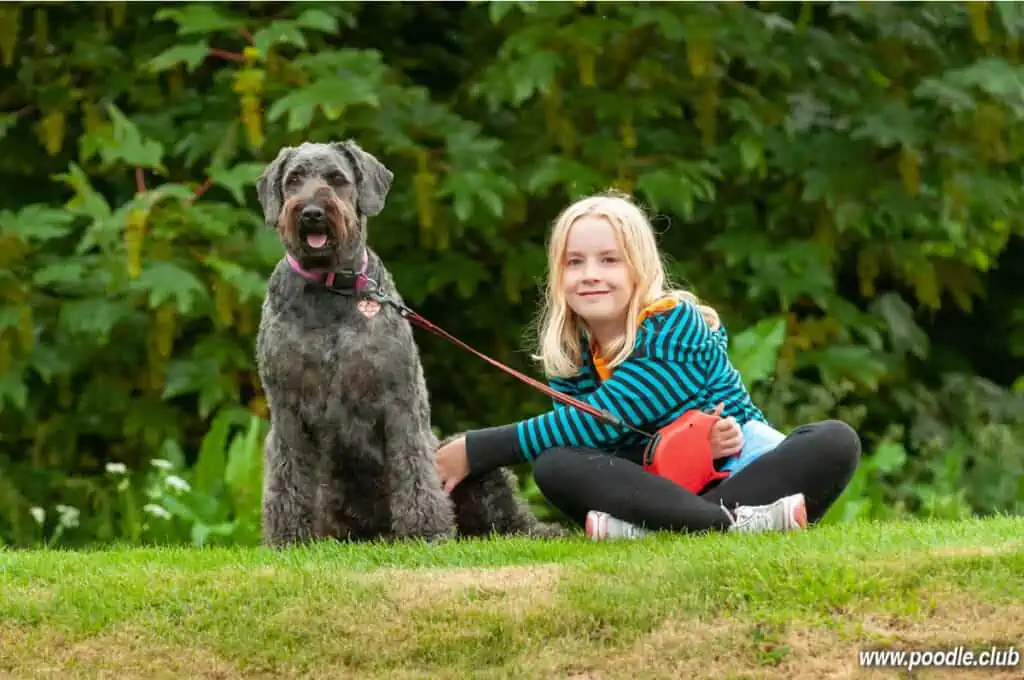Can Labradoodles Be Service Dogs?
Labradoodles have gained popularity in recent years, not only for their adorable appearance but also for their friendly and intelligent nature. This combination of traits might have you wondering if these lovable dogs can be trained to become service dogs.
A service dog is a specially trained canine that performs specific tasks to assist individuals with disabilities. Labradoodles, being a mix of Labrador Retrievers and Poodles, inherit the best characteristics from both breeds, making them excellent candidates for a variety of service dog roles.
Their intelligence, gentle temperament, and hypoallergenic coat make them particularly suitable for this purpose.

As you dive deeper into the world of Labradoodles, it’s essential to understand how these dogs can make a difference as service animals, the training process they undergo, and the legal aspects of service dogs that owners should be aware of.
Key Takeaways
- Labradoodles inherit traits making them excellent service dog candidates.
- Training is crucial for Labradoodles to become effective service dogs.
- Familiarity with legal aspects of service dog ownership is important.
Understanding Labradoodles
Labradoodles are a popular hybrid breed, combining the traits of the Poodle and the Labrador Retriever. These dogs are known for their friendly and intelligent nature, making them great companions and potential service animals.

The Labradoodle is a product of intentional breeding between a Poodle – known for their intelligence and hypoallergenic coat – and a Labrador Retriever, loved for their friendly and gentle temperament. This combination results in a dog breed that is not only smart and trainable but also has the desirable qualities of a friendly and social companion.
When considering a Labradoodle as a potential service dog, it is essential to be aware of the breed’s variations, particularly in size. Labradoodles may be classified into three main sizes: standard, medium, and miniature, depending on which size Poodle was used in the breeding. Standard Labradoodles, derived from the largest Poodle size, can reach up to 24 inches in height and weigh between 50-65 pounds.
Their size may be a factor when considering their suitability for specific types of service work.
Labradoodles have inherited the best traits from both the Poodle and Labrador. The Poodle side contributes to their remarkable intelligence and problem-solving abilities, which make them ideal candidates for service dog tasks. Moreover, the Labrador Retriever genes bring their easy-going, adaptable nature to the mix, enabling them to seamlessly integrate into a variety of environments and situations.
However, just like any breed, individual Labradoodles may have different temperaments, making it crucial for a prospective owner to evaluate each dog’s suitability for service work. Understanding the lineage, training history, and temperament of the Labradoodle you are considering will help in making an informed choice for your service dog needs.
Labradoodles as Service Dogs
Labradoodles are a popular choice for service dogs, as they can provide valuable assistance to individuals with various disabilities. They are exceptionally intelligent and highly trainable, making them suitable for a broad range of tasks.

When it comes to physical disabilities, Labradoodles can be trained to help with daily tasks, such as opening doors, fetching items, and even assisting with getting dressed. Their strength and agility make them a reliable support for individuals who may need help with mobility or balance.
PuppySpot is a reputable dog marketplace where you can browse and find compatible puppies right from the comfort of your home. They have placed over 200,000 puppies into homes in the US!
For those with mental disabilities, Labradoodles can be equally beneficial. They excel as therapy dogs, providing emotional support and companionship to individuals coping with anxiety, depression, or other mental health issues. Their gentle and affectionate nature makes them particularly effective in this role.
In addition to their skills in carrying out specific tasks, Labradoodles are also known for their guiding abilities. They make reliable guide dogs for visually impaired individuals, using their keen senses and intelligence to safely navigate their handlers through various environments.
One main advantage of choosing a Labradoodle as a service dog is that they usually have a lower shed rate than other breeds, making them a suitable option for individuals with allergies.
When selecting a service dog, it’s crucial to consider the specific needs and requirements the animal will be expected to fulfill. Labradoodles, with their diverse skill set and caring nature, can make an ideal companion and support for various disabilities. As with any service dog, proper training and a strong bond between the handler and the dog are essential for success.
Training Process for Labradoodles as Service Dogs
To succeed in training your Labradoodle to be a service dog, it’s essential to understand their unique traits and characteristics. Labradoodles are intelligent, trainable, and energetic dogs, making them ideal candidates for service work.

Begin by establishing a strong foundation of obedience. This means teaching your Labradoodle basic commands such as sit, stay, and heel. Your dog should be able to follow these commands consistently and without hesitation.
As a high-energy breed, incorporating exercise into their training routine is essential. Regular walks, play sessions, and mental stimulation will help keep their focus sharp and improve their overall trainability.
As you progress in your training, introduce tasks specific to your Labradoodle’s intended service role. This could involve guiding, fetching, or providing physical support. Remember to always maintain a confident and clear tone when giving commands.
Your dog will look to you for guidance, so it’s vital to be a strong and knowledgeable leader.
Socialization is also a critical aspect of training a service Labradoodle. Expose your dog to various environments, people, and other animals from a young age. This will help them become more adaptable, reduce stress, and improve their ability to focus on their tasks in public settings.
In summary, training a Labradoodle as a service dog requires dedication, consistency, and a comprehensive understanding of your dog’s needs. Ensure that obedience, exercise, and socialization are prioritized throughout their training process to achieve the best results.
Legal Aspects of Service Dogs
When considering a Labradoodle as a service dog, it’s important to understand the legal aspects surrounding service animals. Under the Americans with Disabilities Act (ADA), service animals are defined as dogs, and sometimes miniature horses, that are individually trained to perform tasks for people with disabilities. Service animals perform specific tasks that directly relate to their handler’s disability, such as guiding a visually impaired person or providing balance to someone with mobility issues.

Unlike service animals, emotional support animals (ESAs) and therapy dogs do not have the same legal protections. ESAs provide companionship and emotional support to individuals with psychological or emotional disabilities, whereas therapy dogs visit various settings like hospitals and schools to provide comfort and affection. Despite providing valuable assistance, neither ESAs nor therapy dogs are considered service animals under the ADA.
Here are some key points regarding ADA laws and service dogs:
Access rights: Service animals, including Labradoodles when trained as such, are allowed access to public places where other dogs are typically not permitted. This includes restaurants, hotels, and public transportation. The ADA requires businesses and public entities to make reasonable modifications to accommodate service dogs.
Inquiries allowed: When encountering a service dog and their handler, the ADA allows for only two specific questions: (1) Is the dog a service animal required because of a disability? (2) What work or task has the dog been trained to perform? Inquiries about the person’s disability, details of the training, or requesting certification or documentation are not permitted.
Responsibilities of handlers: Service dog handlers are responsible for ensuring their dog is under control at all times. This includes using a leash, harness, or tether, unless it interferes with the dog’s task. Handlers must also promptly clean up after their service dog and ensure they don’t disturb the normal operations of a business or public place.
By understanding the legal aspects of service dogs, including their rights and responsibilities, you can ensure a successful and lawful partnership with your Labradoodle as a service animal.







![What is a Merle Poodle [Explained]](https://poodle.club/wp-content/uploads/2022/12/what-is-a-merle-poodle-768x512.webp)